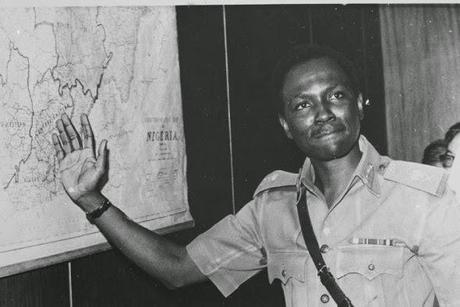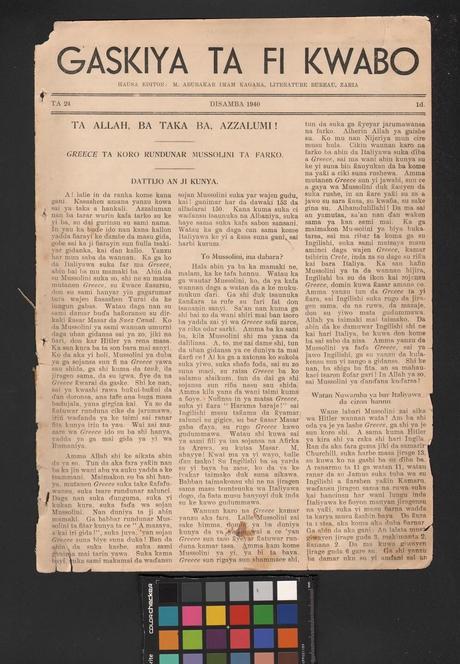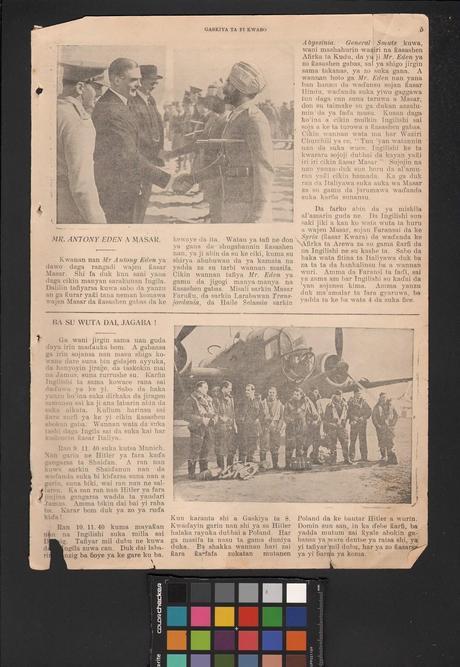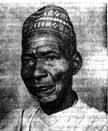
Major Yakubu Gowon at Dodan Barracks, Sept 13 1968
(Source: Nairaland)
"In Hausa, there has been little written recently looking back to that period [Nigerian Civil War]. Nevertheless, there was a considerable body of material in verse produced during the war years (1967-70) and published in the main Hausa language newspaper, Gaskiya ta Fi kwabo, or recited at gatherings and over the radio." (Furniss, 1991:21).Gaskiya Ta Fi Kwabo (The truth is worth more than a Kwabo [Kobo - Nigerian currency]) is a Hausa-language newspaper in northern Nigeria and the first newspaper published entirely in Hausa.


Gaskiya ta fi Kwabo, Issue 24, Nov 1940 (source: Endangered Archives, British Library)
Furniss then goes on to write about a "competition ... held in 1968 for the best poem written in praise of the Federal forces':
Most of the poetry submitted praised the qualities of major Northern figures in the Federal army and government like Yakubu Gowon (Head of State from 1966 - 1975):
Akilu Aliyu
"Some seven hundred entries were received and many of the manuscripts from that competition have been collected in the publication produced by the Centre for the Study of Nigerian Languages in Kano, entitledWakokin yabon soja. The winner of the competition was the doyen of Hausa poetry-writers, Akilu Aliyu, with the poem entitiled Jiki Magayi." (Furniss, 1991:21)
Leader of the age, my heart bids me make this song for you, Major Yakubu Gowon, great one, leader of soldiers. The world recognises you, your zeal and your honesty. Your patience is very great. You have no elder, only younger brothers among all the soldier-governors. You have no fear, only respect for others. If any man opposes you or acts shamelessly, compel him to return to the road, commander of the host of soldiers. Your great zeal, Mamman Shuwa has long been known, and now today I shall include it in this account of the soldiers. I too would like to learn - I refuse to swerve from the road; give me the form to sign, Muhammadu Shuwa, who holds the reins of the soldiers. Like a great steed that fills the eye, Murtala, leader of men, you who set brave men to work to cook - not tuwo but soldiers' cannon. Major Yakubu Dan Juma, tenfold greetings! (Skinner, 1980:220-1 in Furniss, 1991:22)
When they weren't praising 'great men', the poetry was vilifying Ojukwu (the leader of the Republic of Biafra from 1967-1970), with Furniss writing that most of the poetry was anti-Igbo:
Soldiers who leave no malicious attack unavenged, who fear no quarrel;
it is you who subjugate the shameless one, the one who has deviated far from the right way.
Toss him and catch him like a stone in carabke.
Give him your sort of cola-nuts, that he has asked for!
And since he has provoked you, do your duty by him.
Don't ket Ojukwu get away with it, soldiers.
Hey Ojukwu! You lie! Your guessing game
and your soothsayers are both given the lie. Brave men are after you and they will catch you, the soldiers.
You black, rebel scum! Offspring a village girl.
Today your charm's power is broken. You think you can hide, but you're
playing the ostrich before the eyes of our soldiers.
Today you have no place left in which to lie low, my monkey can see you,
Now where's your idle talk? Now where's your babbling? If you breathe a
syllable - up comes a soldier!
What's the matter with you, Ojukwu? I see you frown,
and increase the intensity of your screaming. Has some calamity come upon you?
Yes you've met the range of the soldiers.
Don't be afraid! A grown man does not cry at the razor
Wherever you are, inside or outside, slow down and go and seek peace from the soldiers.
(Skinner, 1980:221 in Furniss, 1991:23)
Finally,
" ... a number of poems present a chronology of events leading up to the outbreak of hostilities and an outline of the progress of the war at the time of writing. For example, Faduwar Enugu (The Fall of Enugu) dated 5/10/67 by Mudi Spikin; Tarihin Yakin Nijeriya farkon somawa daga 27/5/67 zuwa 7/10/67 (The history of the Nigerian War from its inception on 27/5/67 to 7/10/67) again by Mudi Spikin, in which the author sets out his understanding of the sequence of events leading up to the secession ... The poem goes in detail through the progress of advances and retreats, ground and air attacks and the disposition of the Federal forces and their senior officers.
The background narrative setting in a number of poems, Alhajiya 'Yar Shehu's Waka da Bayani and others, includes a picture of Nigeria prior to the outbreak of the war in which each part of the country contributed resources to the whole, the North grain crops, cotton, metal working, skins and hides; the South oil, both palm and petroleum, cola nuts and other things." (Furniss, 1991:24)In Bearing Witness: Readers, Writers and the Novel in Nigeria, Wendy Griswold estimated that three quarters of Biafran novels are by Igbo authors (some exceptions she mentioned includes Wole Soyinka's Season of Anomy, Ken Saro-Wiwa's Sozaboy and Elechi Amadi's Estrangement). So it's really interesting to get this small glimpse into the writings of Hausa poets during this period of Nigeria's history.
Excerpts from Graham Furniss (1991) 'Hausa poetry on the Nigerian civil war', African Languages and Culture, 4:1:21-28


